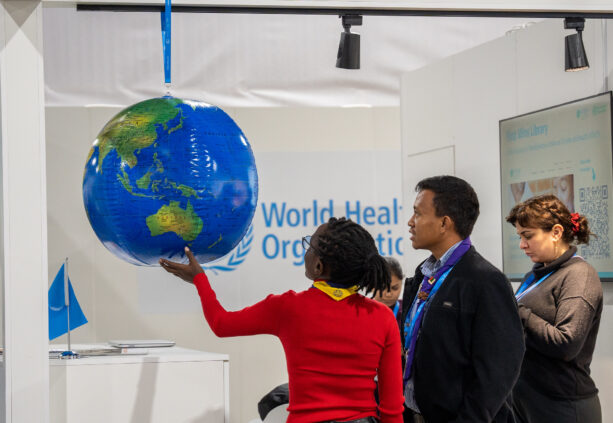
A high-level event, COP Presidencies Bringing Health to the Centre of the Climate Agenda, co-hosted by the World Health Organization (WHO), Spain, Azerbaijan, and the COP29 Presidency, underscored health’s critical role in climate discussions. The event also saw the signing of the Letter of Intent to establish the Baku COP Presidencies Continuity Coalition for Climate and Health, strengthening long-term collaboration.
WHO played a key role at COP29 with the COP29 Health Pavilion providing a dedicated space for dialogue, the launch of the COP29 Special Report on Climate Change and Health, and the release of WHO Guidance on health in Nationally Determined Contributions (NDCs). These initiatives were complemented by a series of high-level events that highlighted health’s growing prominence in climate policymaking.
The World Meteorological Organization (WMO) emphasized its leadership in advancing the Early Warnings for All (EW4All) initiative, aiming to ensure universal coverage of life-saving early warning systems by 2027. Speakers at the high-level EW4ALL event also focused on the growing sense of urgency to deal with the escalating crisis of extreme heat, in alignment with the UN Secretary-General’s Call to Action on Extreme Heat.
The Azerbaijan Presidency demonstrated leadership by launching 14 Action Initiatives, many linked to health, including the Baku Initiative on Human Development for Climate Resilience. Health was also a central theme of COP29 Health Day on November 18, as well as at several events during the World Leaders Climate Action Summit.
In collaboration with the Alliance for Transformative Action on Climate and Health (ATACH), WHO continued to promote commitments to climate-resilient, low-carbon health systems. COP29 reinforced health as an essential pillar of the climate agenda, setting the stage for meaningful action in the years to come.
This is an evolving list of all health-focused events and announcements / outcomes at COP29. Please submit additions or change requests to admin@climahealth.info.
The Conference of the Parties (COP) to the UN Framework Convention on Climate Change (UNFCCC) is the world’s foremost international climate summit. At COPs, world leaders gather to work together on solutions to tackle climate change. There are now 198 Parties to the Convention, constituting near universal UN membership.
Climate change is a global challenge. Collaborative approaches and collective agreement are required to develop, adopt, and implement effective, expedient policies at all scales.
Most United Nations forums address climate change or include its risks in their scope of work. Global environmental agreements generally feature climate change prominently. The UN General Assembly (UNGA), the UN Environment Assembly (UNEA), and the World Health Assembly (WHA), all periodically adopt resolutions related to climate change.
The central body influencing global governance of climate change is the United Nations Framework Convention on Climate Change (UNFCCC) which is a decision-making forum of 197 countries. The Intergovernmental Panel on Climate Change (IPCC), which functions as a global repository on climate change knowledge, informs UNFCCC intergovernmental negotiations on policy-relevant science. At its establishment in 1992, the UNFCCC recognized the linkage between climate change and adverse impacts to human health. (UNFCCC Article 1)
However, the primary objective of negotiations under the UNFCCC is to address mitigation of anthropogenic emissions that drive climate change – or, as written in in the treaty, to achieve “the stabilization of atmospheric greenhouse gas concentrations in the atmosphere at a level that would prevent dangerous anthropogenic interference with the climate system”. (UNFCCC Article 2)
Over the last 30 years, the inherent link between the stabilization of greenhouse gas emissions and health promotion has not been fully realized or valued in an intergovernmental, interdisciplinary, or comprehensive way. (1)
The stabilization and reduction of greenhouse gases will promote health and positive health outcomes, including on food security and nutrition, water, sanitation, and hygiene (WASH), and air quality and exposure to pollutants. When designed well, climate policies can play a significant role in protecting and promoting public health.
A few health references are incorporated into the framework agreement of the UNFCCC and the international environmental law of the Paris Agreement.
In a historic milestone marking the inaugural Health Day at the 28th UN Climate Change Conference (COP28), global leaders united in endorsing the COP28 Declaration on Climate and Health, sounding the alarm on the severe health implications of climate change. Emphasizing the critical role of the UNFCCC and the Paris Agreement, the declaration underscores the urgent need to confront the connections between climate change and health.